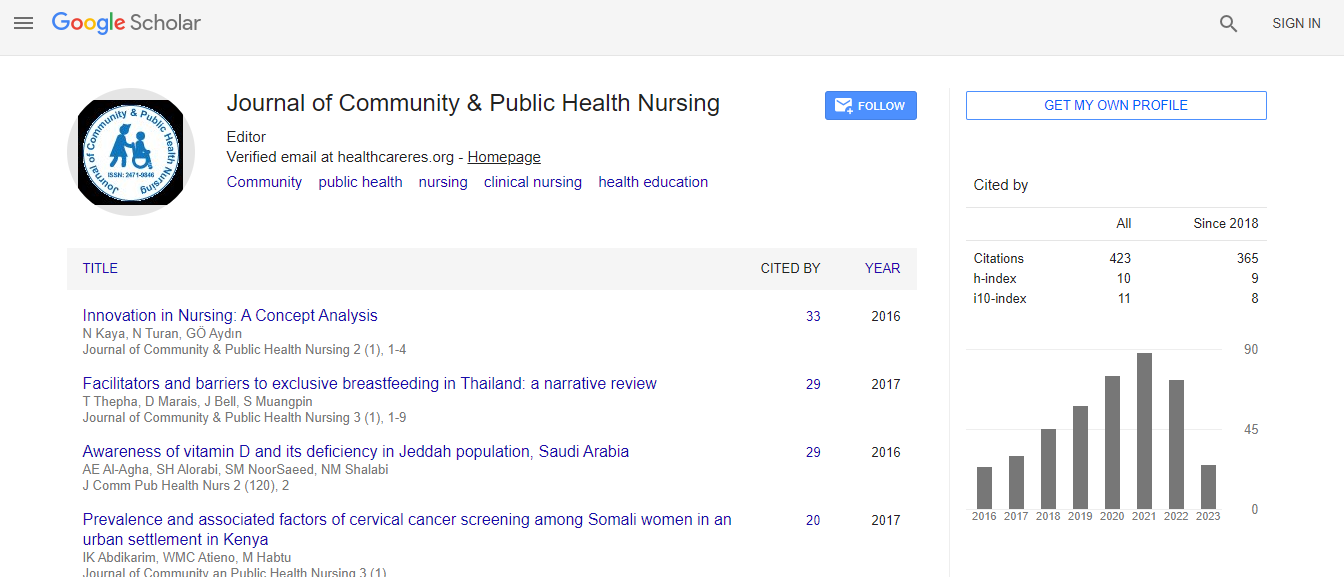Research Article
First Trimester Prenatal Care and Local Obstetrical Delivery Options for Women in Poverty in Rural Virginia
Maria Gilson deValpine1*, Matthew Jones2, Deborah Bundy-Carpenter3and Jonathan Falk31James Madison University School of Nursing, Harrisonburg, Virginia, USA
2Portland State University, Portland, Oregon, USA
3Central Shenandoah Health District, Staunton, Virginia, USA
- *Corresponding Author:
- Maria Gilson deValpine, RN, MSN, Ph.D.
James Madison University School of Nursing
MSC 4305, HSB 4024, Harrisonburg Virginia 22807, USA
Tel: 5032396081
E-mail: devalpmg@jmu.edu
Received date: September 01, 2016; Accepted date: September 27, 2016; Published date: October 04, 2016
Citation: deValpine MG, Jones M, Bundy-Carpenter D, Falk J (2016) First Trimester Prenatal Care and Local Obstetrical Delivery Options for Women in Poverty in Rural Virginia. J Comm Pub Health Nurs 2:137. doi:10.4172/2471-9846.1000137
Copyright: ©2016 deValpine MG, et al. This is an open-access article distributed under the terms of the Creative Commons Attribution License, which permits unrestricted use, distribution, and reproduction in any medium, provided the original author and source are credited.
Abstract
Healthy People 2020 recommends improvements in rural women’s health in the United States, and specifically, prenatal care. A rural Virginia health department requested this study to assess prenatal care and obstetrical delivery options for impoverished women in the Central Shenandoah Valley.
Births to resident mothers between 2000 and 2011 were examined by payer source, care source, first prenatal visit timing, and delivery location. Providers, public health nurses, and women were interviewed to assess barriers.
Resident women delivered 32,423 infants between 2000 and 2011. Prenatal care initiation differed by payer source and care source. Approximately 89% of privately insured patients initiated prenatal care in the 1st trimester, compared to 66% of Medicaid, and 57% of uninsured women. Approximately 80% of private care women initiated prenatal care as recommended; 50% of public care women did so. Overall 21% of Central Valley women were unable to obtain 1st trimester prenatal care.
Most obstetrical deliveries occur at two community hospitals. High risk deliveries are referred to a university hospital outside the region. Family practitioners are not credentialed for regional hospitals deliveries and provide no prenatal care. Most prenatal care is provided by four obstetrical practices.
Interviewees differed regarding barriers to timely prenatal care. Providers identified insurance and cultural barriers. Public health nurses viewed referral mechanisms, insurance, culture, pregnancy denial, and transportation. Women identified finances and culture as barriers, but described them in complex ways. Culture, in their view, constructs a financial barrier and one they worked hard to overcome. Transportation was not identified as a barrier but rather a matter of course in rural areas.
It is not surprising that impoverished women frequently fail to obtain timely prenatal care. Policy solutions to improve this situation include addressing financial barriers. However, given that impoverished women face many social barriers in addition to finances, solutions that enhance evidence-based case management and home visiting programs recommend to achieve the best outcomes.

 Spanish
Spanish  Chinese
Chinese  Russian
Russian  German
German  French
French  Japanese
Japanese  Portuguese
Portuguese  Hindi
Hindi 
